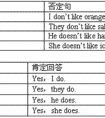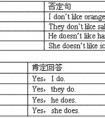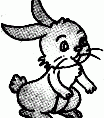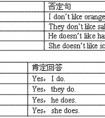句型转换。 1. Is that an orange? (变成复数句)_____________________________________________2. I'm Rose. (变成一般疑问句) ____________________________________-六年级英语
题文
| 句型转换。 |
| 1. Is that an orange? (变成复数句) _____________________________________________ 2. I'm Rose. (变成一般疑问句) _____________________________________________ 3. Wang Hua isn't at school today. (就画线部分进行提问) _____________________________________________ 4. I'm OK. (就画线部分提问) _____________________________________________ 5. She looks like her sister. (变为同义句) _____________________________________________ |
答案
| 1. Are those oranges? 2. Are you Rose? 3. Who isn't at school today? 4. How are you? 5. She and her sister look the same. |
据专家权威分析,试题“句型转换。 1. Is that an orange? (变成复数句)_____________..”主要考查你对 一般疑问句,复数名词,指示代词,疑问代词,系动词,动词短语 等考点的理解。关于这些考点的“档案”如下:
一般疑问句复数名词指示代词疑问代词系动词动词短语
考点名称:一般疑问句
- 一般疑问句:
是疑问句的一种。它是以be动词,have或助动词、情态动词开头,用yes(是)或no(否)来回答的句子。
其结构是:系动词be/助动词/情态动词+主语+其他成分
一般疑问句的肯定形式为:
助动词+主语(+实义动词)。肯定答语用“yes+可定结构”。
一般疑问句的否定形式为:
助动词构成的缩写否定词+主语(+实义动词)。否定答语用“no+否定结构”。
例:
— Do you like this story-book? 你喜欢这本故事书吗?
— Yes, I do. 喜欢。/ No, I don’t. 不喜欢。
— Is he a student? 他是一名学生吗?
— Yes, he is. 是,他是。/ No, he isn’t. 不,他不是。 一般疑问句的改写:
一、含有be动词的一般疑问句,通常把be动词调到句首。例如:
陈述句:They are in the swimming pool.
一般疑问句:Are they in the swimming pool?
注意:一般疑问句句末要用“?”。
二、含有情态动词的一般疑问句(can, may...),把情态动词调到句首。例如:
陈述句:He can drive a car.
一般疑问句: Can he drive a car?
三、含有have的一般疑问句,have译为“有”。一般疑问句式有两种形式:
1.把have/has调到句首。例如:
陈述句:Tommy has a computer.
一般疑问句:Has Tommy/he a computer?
2.加助动词do/does,第三人称单数用does,其他人称用do。其句型为:Do/Does + 主语 + have...?
例如上句可变为: Does Tommy have a computer?四、一般动词的一般疑问句,也要借助助动词do/does,第三人称单数用does,其余人称用do。
其句型为:Do/Does + 主语 + 动词原形+其它?
陈述句:Amy speaks English.
一般疑问句:Does Amy speak English?一般疑问句的回答:
首先要有人称的改变。当主语为名词时,在答语中要改成其相应的代词。
另外,答语有两种,肯定的回答(用yes)和否定的回答(用no),否定式常用缩写形式。
现在还是让我们分句型一一说明。一、一般疑问句含be动词时,用be动词回答,句末用句号。例如:
-Is Mary your sister?
-Yes, she is. / No, she isn’t.(缩写)二、一般疑问句含有情态动词(can, may, should等)时,用情态动词回答。例如:
-May I come in?
-Yes, you may. / No, you can’t.三、一般疑问句含有have(译为“有”)时,有两种回答方式。
1.直接用have/has回答。
例如:
-Have they any pictures?
-Yes, they have. / No, they haven’t.
2.用助动词do/does回答。
例如:
-Does Millie smoke?
-Yes, she does. / No, she doesn’t.四、一般动词的一般疑问句回答时也用助动词。
例如:
-Do the workers live in London?
-Yes, they do. / No, they don’t.
考点名称:复数名词
- 复数名词:
指名词的数量大于“一”,如:two books, some students
名词变复数:
1、一般情况下,词尾加s。如:students,apples,bags,trees,books,brothers
2、s,x,z,sh,ch等结尾的名词,词尾加es。如:glasses,boxes,brushes,matches
3、y结尾的名词分两种情况,“辅音字母+y”结尾的名词,将y变为ies;
“元音字母+y”结尾的名词,直接在词尾加s。
以辅音字母加y结尾的名词,变y为i加es:cities,babies,enemies。
以元音字母加y结尾的名词,如:boys
4、f或fe结尾的名词,一般将f或fe变为ves。如:leaf-leaves, wife-wives, knif-knives
5、规则名词:foot→feet,tooth→teeth, child→children,man→men, woman→women,
sheep→sheep,deer→deer, mouse→mice. - 名词变复数规则:
情况
构成方法
例词
读音
一般情况
在词尾加-s
desk→desks
map→maps-s在清辅音后发/s/
day→days
girl→girls-s在元音和浊辅音后发/z/
以s,x,ch,sh结尾的词
在词尾加-es
bus→buses
box→boxes
watch→watches
fish→fishes-es发/iz/音
以辅音字母加-y结尾的词
变y为i再加-es
family→families
factory→factories
party→patries-ies发/iz/音
以元音字母加-y结尾的词
在词尾加-s
day→days
boy→boys
key→keys-s发/z/音
以f或fe结尾的词
变f或fe为v再加-es
knife→knives
life→lives
wife→wives
half→halves-ves发/vz/音
以辅音字母加-o结尾的词
在词尾加-es
potato→potatoes
tomato→tomatoes
hero→heroes-es发/z/音
以元音字母加-o结尾的词
在词尾加-s
- 最新内容
- 相关内容
- 网友推荐
- 图文推荐
- — Do the girls in red jump high(2019-08-31)
- — Are you twelve?— Yes, ______(2019-08-31)
- — Will the computer help us lea(2019-08-31)
- 将下列陈述句改为一般疑问句并作肯(2019-08-31)
- 将下列陈述句改为一般疑问句,并作(2019-08-31)
- 将下列句子改为否定句和一般疑问句(2019-08-31)
- 将下列句子改成否定句和一般疑问句(2019-08-31)
- 将下列句子改为否定句和一般疑问句(2019-08-31)
- 将下列句子改成否定句和一般疑问句(2019-08-31)
- 句型转换。1. Jenny is a child. (变一般疑问句)_____
- 句型转换。1. There are five books in my bag. (对画
- 句型转换。1. We call it a kid. (就划线部分提问)___
- 句型转换。按要求改写句子。1. I do morning exercise
- 按要求进行句型转换。1. You can see that is a pear.
- 句型转换。1. Iwatched TV yesterday evening. (改为一
- 句型转换。1.It's a book about London. (对画线部分提
- 句型转换。1. We call it a kid.(画线提问) _________
- 句型转换。1. There is a computer on the desk. (否定
- 句型转换。1. This is my pencil case. (改为一般疑问
- 按要求对下列句子进行句型转换。1.(2019-08-31)
- — IsheyourEnglishteacher?— .[ (2019-08-31)
- Isthis the library? [ ]A.Yes, it(2019-08-31)
- —______—Yes, it is.[ ]A. Is it(2019-08-31)
- — Isthatacar? — Yes,_____. [ ](2019-08-31)
- Do you like pepper? [ ]A. Great!(2019-08-31)
- 按要求写句子。1. May I go on a t(2019-08-31)
- — Doyouhaveamap?— .[ ]A.Yes,he(2019-08-31)
- —Areyouhungry? —__________.[ ](2019-08-31)
- Canyouseethepicture?Yes, _______(2019-08-31)
上一篇:— Are you Dick?— Yes, _____.[ ]A. I am B. you are C. I'm-六年级英语 下一篇:— Can I help you ?— ____.[ ]A. No, I don't knowB. Yes, I want a bookC. No, please-六年级英语零零教育社区:论坛热帖子[家长教育] 孩子为什么会和父母感情疏离? (2019-07-14) [教师分享] 给远方姐姐的一封信 (2018-11-07) [教师分享] 伸缩门 (2018-11-07) [教师分享] 回家乡 (2018-11-07) [教师分享] 是风味也是人间 (2018-11-07) [教师分享] 一句格言的启示 (2018-11-07) [教师分享] 无规矩不成方圆 (2018-11-07) [教师分享] 第十届全国教育名家论坛有感(二) (2018-11-07) [教师分享] 贪玩的小狗 (2018-11-07) [教师分享] 未命名文章 (2018-11-07)





![____ it got four wheels?[ ]A. Have B. There C. Has-五年级英语](http://www.00-edu.com/d/file/ks/4/1/65/2019-08-31/small2ca0aeba76320ba6f81e40fe83a0e8111567199443.png)
